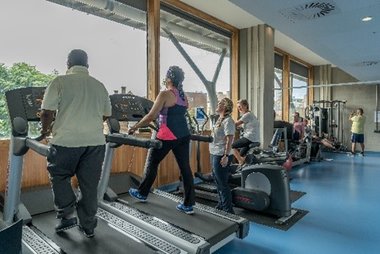Improving cancer care before treatment even starts
Sam Tordesillas, SELCA Personalised Cancer Care Lead, shares how prehabilitation pilots demonstrated multiple benefits to cancer patients.
Can you introduce us to cancer prehabilitation and what it aims to achieve?
Cancer prehabilitation helps patients prepare physically and emotionally for their treatment, by providing them with a tailored programme of exercise, nutritional and psychological advice depending on their individual needs. As cancer treatment is known to be grueling, it is important that people about to undergo treatment are in the best possible shape, to enable them to recover and heal quickly.
and emotionally for their treatment, by providing them with a tailored programme of exercise, nutritional and psychological advice depending on their individual needs. As cancer treatment is known to be grueling, it is important that people about to undergo treatment are in the best possible shape, to enable them to recover and heal quickly.
Macmillan outlines that prehabilitation aims to ‘empower patients to maximise resilience to treatment and improve long-term health’. By promoting healthy behaviours and increasing physical activity through both cardiovascular and muscle strengthening exercise prior to cancer surgery, there are multiple benefits including reducing post treatment complications, enhancing recovery, and reducing length of stay. This is in addition to the longer-term benefits to general health and condition management. Different patients will have different grades of needs, therefore screening these needs enables a personalised programme tailored to the individual to be offered.
Prehabilitation is not a new concept, it has also been known as preventative rehabilitation, and is a crucial part of the rehabilitation pathway for people with cancer. However, its application in cancer as part of the wider preoperative programmes, which include Enhanced Recovery and medical optimisation, have a growing evidence base. Prehabilitation has a particularly important role currently as the COVID-19 lockdowns have had a negative effect on people’s activity rates and emotional wellbeing, meaning that levels of physical and emotional fitness in patients presenting for their treatment is less than it would have been before the pandemic.
What does the evidence tell us about its effectiveness in pilots in south east London? What have been the benefits for staff and patients?
The pilots showed us that cancer prehabilitation works best when it is incorporated into a holistic multidisciplinary optimisation programme. Patients were very receptive to enrolment onto the prehabilitation programmes and demonstrated good adherence to their individualised diet and exercise regime. We also saw that psychological concerns were picked up early.
The pilots demonstrated multiple benefits, including increased cardiovascular fitness, less surgical complication rates, reduced hospital readmission (8% vs the national average of 41% for one pilot), and sustained behaviour change over time. The pilots highlighted examples where patients who were assessed as not fit enough to undergo treatment and would have otherwise moved to a palliative pathway, went on to proceed with their curative treatment following completion of the prehabilitation programme. Patient satisfaction was high, with patients reporting gaining a sense of control over their own health and wellbeing.
South East London Cancer Alliance (SELCA) held a prehabilitation workshop in November – what was the aim of the event?
The purpose of the workshop was to bring together key stakeholders from hospital Trusts, community settings, primary care and charities across health care settings in south east London to raise the profile of cancer prehabilitation. It also provided an opportunity for professionals to meet, network, and support each other in developing prehabilitation services. The aims of the event were to review and celebrate the progress with cancer prehabilitation activity in south east London to date, agree on south east London principles for cancer prehabilitation, and to explore how we could work together as a system to move towards prehabilitation being a routine offer for all patients undergoing cancer treatment.
What’s next for prehabilitation in south east London?
SELCA has funded pilots at all three acute hospital Trusts in south east London in specific cancer types. Where the pilots have finished, the services have been picked up and continued in those Trusts. Our aim now would be to support these Trusts to roll out a wider prehabilitation offer to all patients regardless of what kind of cancer they have. The majority of patients undergoing treatment would be screened as needing healthy lifestyle, nutrition and physical activity advice only, therefore we plan to develop this information resource on a south east London wide basis. And we want to work with our patient partners to incorporate their views, ideas and opinions to make sure we get it right for them.
Find out more about South East London Cancer Alliance at selca.nhs.uk.
Work in Primary Care? Watch Sam and colleagues present ‘Prehabilitation – the story so far’ at the Primary Care Webinar from 8th December 2021, via the KHP Learning Hub.